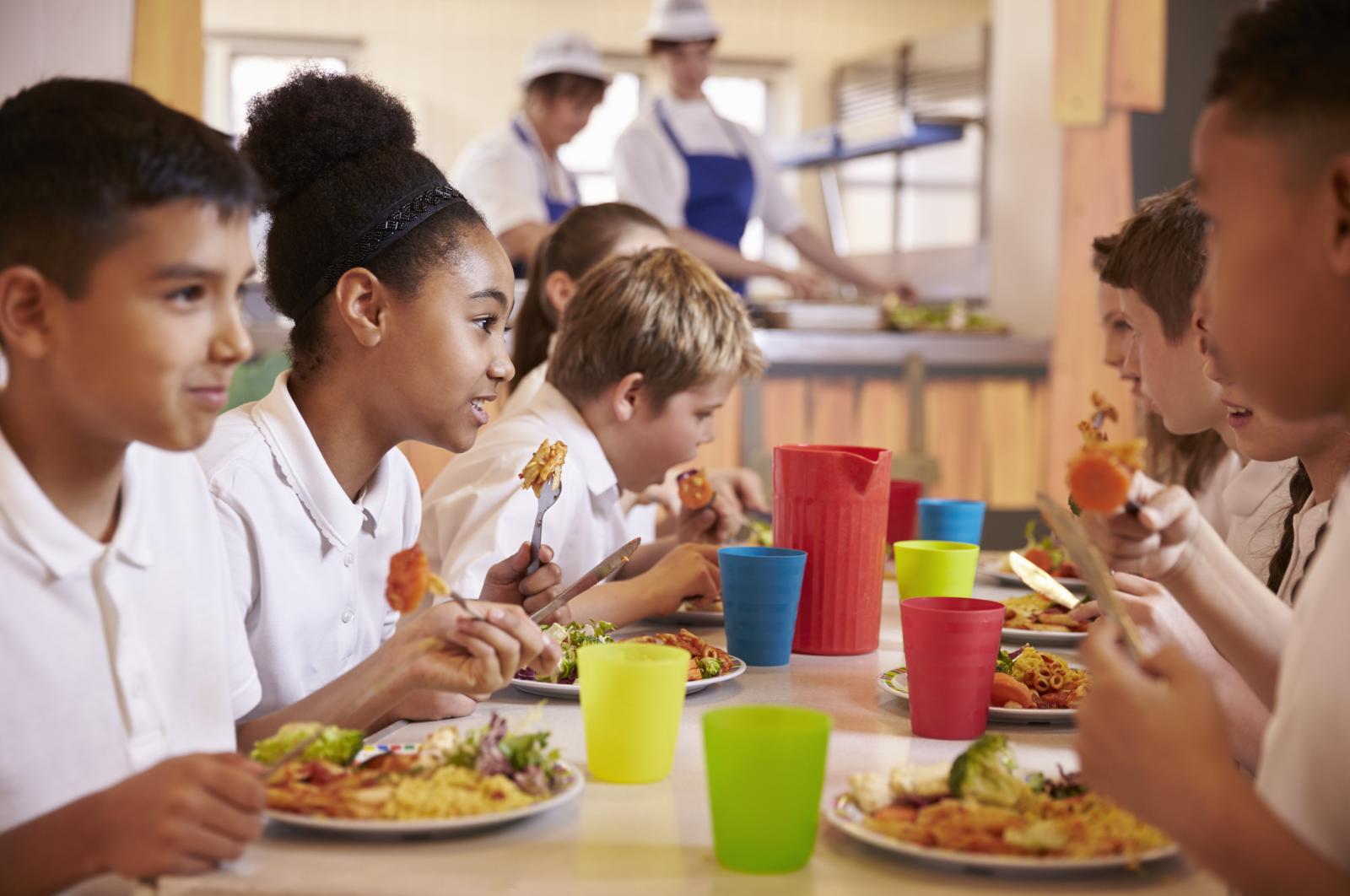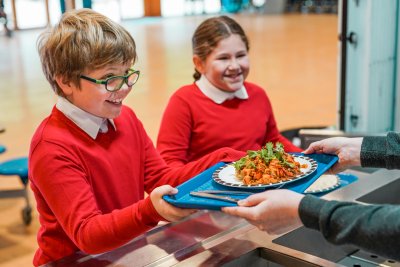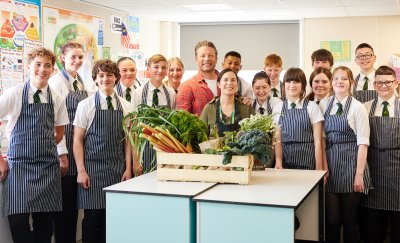 Credit: Shutterstock image
Credit: Shutterstock image
9 in 10 parents say Government should provide healthy free school meals for all children in poverty
Marcus Rashford's child poverty campaign has been boosted as research from Children's Food Campaign and Food Active reveals 92% of parents support extension of free school meal eligibility to all children living in very low-income and food insecure famlies.
Parents overwhelmingly back extending free school meals to all children in poverty, according to new research released as millions of children return to school after months of lockdown. In another boost for the child poverty campaign launched by footballer Marcus Rashford, the survey with over 750 parents reveals 92% would support the Government reviewing and expanding eligibility for free school meals to ensure all children living in families with low income or at risk of food insecurity and poverty have access to them.
The survey conducted by the Children’s Food Campaign and Food Active paints a vivid picture of how children’s eating and drinking habits were affected during lockdown, with one in three (31%) saying they had found it harder to maintain healthy, nutritious eating habits whilst children were at home.
- 7 in 10 parents reported that their children ate more snacks as a result of being in lockdown.
- Children ate more crisps (35%), ice creams and lollies (46%), cakes and biscuits (40%), sweets and chocolate (30%).
- 54% of parents surveyed said more home cooked meals were eaten whilst 43% said they ate the same as usual.
- 2 in 5 children (40%) ate more fruit and veg, whilst 1 in 3 (33%) drank more water.
- Boredom, anxiety, and treats and rewards for good behaviour were cited by parents as reasons their children wanted constant snacks and food.
The research also reveals a continued high degree of concern amongst parents about growing levels of children’s food insecurity and hunger. Parents were asked their views on the Government’s commitment to fund free school meals and healthy food policies, as schools reopen this September.
- 9 in 10 parents (90%) agreed that the Government should now review eligibility to make free school meals available to ALL children in poverty. Parents also agree that eligibility should be based on income, regardless of immigration status (89%).
- More than 8 in 10 parents (83%) would also like to see holiday food provision available for all children eligible for Free School Meals.
- More than 7 in 10 (73%) support the Government decision to retain Universal Infant Free School Meals, compared to 26% support for restricting free meals to children in poverty only.
- Almost 7 in 10 (68%) would like the Universal Infant Free School Meal programme extended to the whole of primary schools.
Read the research briefing Covid-19 and Children’s Food: Parents’ Priorities for Building Back Better including comments and quotes from parents.
Barbara Crowther, co-ordinator of the Children’s Food Campaign, says:
“With millions of pupils now returning to school, parents are very clear that providing free school meals to all children experiencing poverty and food insecurity should top the priority list for the Government. Unless they are overhauled, the current eligibility criteria for free school meals mean that over a million children in some of the UK’s hardest-hit households will not get the support they urgently need. This Autumn budget is a critical moment to ensure the Department for Education has the necessary resources to rise to the increased scale of need now being experienced.”
The parents’ findings strongly endorse recommendations contained in the National Food Strategy Part One to extend free school meals to all children in receipt of Universal Credit or equivalent benefits, to roll out school holiday food and activity provision on a national level across England. The Food Strategy is also calling for an increase in the value of Healthy Start vouchers, which support low income parents with purchase of fruit, veg, vitamins and milk during pregnancy and early years.
Premier League footballer Marcus Rashford, who has launched his own child poverty taskforce, is now leading a public campaign calling on the Government to use the Comprehensive Spending Review and Autumn budget to enact the Food Strategy recommendations. A growing coalition of organisations, including Sustain’s Children’s Food Campaign, the Food Foundation, School Food Matters, the Children’s Society, the Association of School Colleges and Leaders and Bite Back 2030, are all calling on the Government to enact the proposals to address food insecurity in the National Food Strategy as part of the forthcoming comprehensive spending review and Autumn budget.
Parents are clear that the health and nutrition of school food is also an important factor in building back a healthier food environment for children.
- 9 in 10 parents (92%) want schools to do more nutrition education and build children’s cooking skills. Around 6 in 10 (59%) said their children were now more interested in cooking, having helped prepare meals at home.
- 9 in 10 parents (89%) want their children to have a healthy sit-down hot or cold school lunch.
- 7 in 10 parents (68%) would like schools to go further in removing unhealthy food items from their own menus and meal breaks.
Beyond school food, two thirds (65%) of parents agree that a healthier diet is more important than ever in light of recent Covid-19 experience. Parents strongly backed further measures to increase availability and affordability of healthier food and drink, and reduce the prompts that will continue to fuel desire to eat less healthy foods and snacking habits. Parents want to see price promotions away from unhealthy foods and towards healthier ones, with more than 1 in 2 (52%) of parents including this in their top three priorities for Government action to build back better. One in five (21%) parents also included a ban on TV/online advertising amongst the top three things that they now want Government to prioritise. Both measures have now been announced as part of the new national Obesity Strategy launched earlier in the summer, with further consultations on the details expected during the Autumn.
Beth Bradshaw, project officer from Food Active who worked on the research, says:
“Parents are very clear about their own responsibilities to encourage healthy food habits, but it’s clear from this research that it’s a constant struggle too. Whether it’s the food served up in schools, or the constant stream of advertising, marketing and price promotions nudging families and children towards treats, fast foods and snacking, we need measures such as those in the obesity strategy to make healthy food the most affordable and appealing choice”.
There could be some win-win policy options for the Government to fund school food programmes as well as reduce prevalence of unhealthy foods through increased use of fiscal incentives. 8 in 10 parents (80%) would like all schools to have healthy breakfast clubs available to pupils. The current National School Breakfast Programme, run by Magic Breakfast and Family Action, was established using income raised by the Soft Drinks Industry Levy (SDIL) – a great example of how the tax can be invested in piloting programmes to improve children’s health and access to food. The levy is estimated to be raising around £340 million per year, according to the Office for Budget Responsibility, but there has been little or no transparency since the first year of funding in 2018-19 on how this money is currently being used by the Department for Education. The Children’s Food Campaign and Sugar Smart UK are proposing that sugar levy income could be used to establish a new Children’s Food Innovation Fund, distributed by local areas to schools to support them to invest in infrastructure or new projects to become healthy food zones. In 2018-19, the Healthy Pupils Capital Fund provided £100 million of local funding for schools, resulting in a wide range of initiatives from installing water fountains and food growing projects, to improving kitchen facilities and cooking classrooms. There is a strong case growing for extending the sugary drinks tax to milk-based sugary drinks and lowering the threshold for the levy to incentivise further sugar reduction, as well as for extending similar models to other less healthy food categories such as confectionery, cakes and biscuits, that could generate additional revenue into the Treasury for investment in children’s health and food programmes in the longer term.
For more information:
Read the research briefing Covid-19 and Children’s Food: Parents’ Priorities for Building Back Better including comments and quotes from parents.
Download a presentation of the full findings from the Covid-19 and Children's Food survey.
Children's Food Campaign: Better food and food teaching for children in schools, and protection of children from junk food marketing are the aims of Sustain's high-profile Children's Food Campaign. We also want clear food labelling that can be understood by everyone, including children.
Sustain
The Green House
244-254 Cambridge Heath Road
London E2 9DA
020 3559 6777
sustain@sustainweb.org
Sustain advocates food and agriculture policies and practices that enhance the health and welfare of people and animals, improve the working and living environment, promote equity and enrich society and culture.
© Sustain 2024
Registered charity (no. 1018643)
Data privacy & cookies







